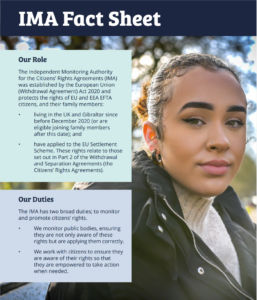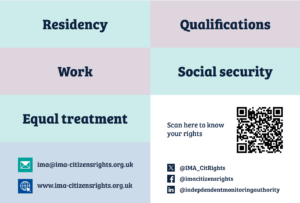Our Duties
We have two main duties:
- Monitoring how UK public bodies are protecting the rights of EU and EEA EFTA citizens and their family members. This means that we actively seek information that will help us to identify where things are going well and where things are not.
- Promoting the effective implementation of citizens’ rights. This means that we help citizens to understand their rights and we help public bodies to understand where things are going wrong so that they can put them right.
Our role
When the United Kingdom (UK) made the decision to exit the European Union (EU) a formal agreement was established to protect citizens whom the exit would impact upon. As part of that, we have been established to make sure the agreement is being properly upheld.
In specific terms, the Independent Monitoring Authority for the Citizens’ Rights Agreements (IMA) protects the rights of EU and EEA EFTA citizens, and their family members, in the UK and Gibraltar.
Essentially, the IMA is here to help make sure people from EU and EEA EFTA countries get the same rights as they did before the UK left the EU.
Visions and values
We ensure the rights of EU and EEA EFTA citizens, and their family members, are at the heart of UK public bodies’ work.
Our values inform the way we work. Our values reflect:
- our independence from government
- our willingness to listen to people and public bodies
- our transparency in the way we work
- our ability to make impartial decisions
- our people centred approach which places people at the heart of everything we do
Who we support
As a citizen of an EU or EEA EFTA country (Iceland, Liechtenstein or Norway), or their family members, your rights are protected by the EU Withdrawal Agreement or the EEA EFTA Separation Agreement.
We have developed a rights leaflet for download and distribution. The leaflet outlines the rights guaranteed to EU and EEA EFTA citizens and their family members under the Withdrawal and Separation Agreements.
This is also available in Other Languages.

Who we monitor
We are responsible for making sure that UK public bodies are respecting the rights of EU and EEA EFTA citizens and their family members.
A public body is any organisation that exercises functions of a public nature.
Public bodies can include:
- government departments (such as the Home Office or HM Revenue and Customs)
- devolved governments in Scotland, Wales and Northern Ireland
- government agencies (such as the Driver and Vehicle Licensing Agency)
- local councils
- non-departmental public bodies (such as NHS England or the Health and Safety Executive)
- public corporations (such as the BBC or the Pension Protection Fund)
Many of the organisations we monitor are on the list of departments, agencies and public bodies on GOV.UK. We are also responsible for monitoring public bodies in Gibraltar.
More information on the IMA’s specific powers can be found on our fact sheet.
This is also available in Other Languages.

What we investigate
We investigate areas we are concerned about based on:
- complaints reported to us by affected citizens
- monitoring how UK public bodies (such as government departments, local councils, the NHS, the police, and others) are protecting the rights of citizens
- where we see a need based on the information we gather through our work
We will particularly focus on areas that affect a large number of citizens or show an underlying problem with how citizens’ rights are being managed.
When we find an issue, we have the power to carry out an inquiry to investigate further and, if necessary, take legal action to fix it.
Although we cannot resolve the individual complaints reported to us, they are vital in helping us find wider problems so we can help protect others from experiencing the same issues.
Information Gathering
We can gather information through wider intelligence monitoring and by issuing a Call for Evidence or through our annual survey. We can also gather useful information to help inform our work from public bodies.
We will ask public bodies to give us information about:
- the number of complaints they receive
- the outcome of the complaints they receive
- actions taken in response to complaints
We will use the information we find to help us understand the areas we need to investigate further, whether through raising issues with departments and other public authorities, conducting inquiries and making recommendations, or more generally sharing and promoting learning and improvements in the way the UK delivers on its commitments to citizens.
An important part of the data we will use to make decisions will come from:
- national surveys
- government research
- information and trends from the bodies we monitor
- information shared with us by bodies supporting and advising European citizens in the UK
Complaints from the public
We have a responsibility to make sure the citizens’ rights included in the EU Withdrawal Agreement and EEA EFTA Separation Agreement are being correctly followed by public bodies.
One of the ways we do this is to ask EU and EEA EFTA citizens, their family members, and others, to report a complaint to us when they are concerned their rights have been, or might be, breached.
We will review all complaints from a person who claims a right set out in the agreements mentioned above.
This includes:
- EU and EEA EFTA citizens and their families
- UK nationals who derive rights from the citizens’ rights part of the Withdrawal Agreement and EEA EFTA Separation Agreement and their families
- anyone who has equivalent rights to those contained in the Withdrawal Agreement or EEA EFTA Separation Agreement as a result of their eligibility to claim settled status
We use the complaints reported to us to build up a picture of where there are common, wide-reaching, or systemic issues with how UK public bodies are operating, rather than for the purpose of resolving individual complaints.
Citizens should still complain in the normal ways to find a resolution to their problem. They will continue to have access to all existing routes of complaint and appeal that exist under UK law, including the many authorities, tribunals and ombudsmen that currently enforce the rights of citizens in the UK.
If a complaint is not within the scope of the IMA, we may signpost you to the relevant public body for you to seek further information.
For anyone unsure of their rights, a QR code card is available for download which links directly to the ‘Your Rights’ page of this website.
This is also available in Other Languages.

Inquiries and legal proceedings
Inquiries
If we believe there may have been a failure or imminent failure in the way in which a UK authority has implemented the citizens’ rights agreements, we can use our powers of inquiry to hold public bodies to account.
We may conduct an inquiry for one of three reasons:
- as a result of a complaint or series of complaints
- as a result of our own monitoring and intelligence gathering
- following a request from a Secretary of State (SoS), Scottish Minister, Welsh Minister or Executive Office in Northern Ireland
We will look for systemic failings to ensure the fair treatment of EU, EEA and EFTA citizens and their family members.
We will not carry out an inquiry unless we have reasonable grounds to conclude that a failure has or is about to occur.
We will set out our concerns to the relevant public body with regards to the way they have interpreted or implemented legal requirements.
Following an inquiry, we will publish reports which set out our conclusions and any recommendations for the public body to address the issue raised. The public body will be expected to confirm what actions they will be taking to each recommendation.
Legal proceedings
We will be able to bring judicial review proceedings against a public body that has failed to implement or apply the citizens’ rights agreements.
This is a type of court proceeding in which a judge will review the lawfulness of a decision or action made by a public body.